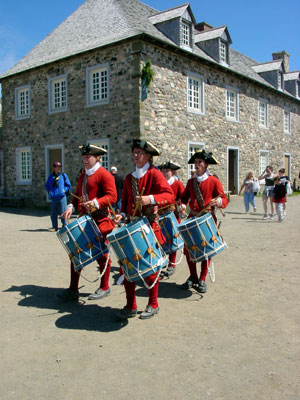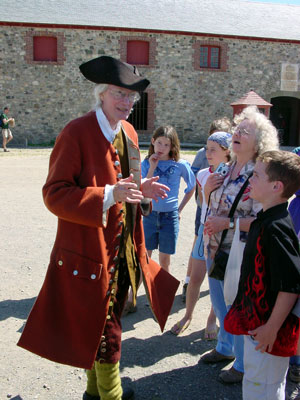
We spent the entire day visiting the Fortress at Louisbourg. The fortress was founded by the French in 1713 and served as the administrative capitol of French holdings in Atlantic Canada and a military and naval base to protect French interests in the area. It was attacked successfully by the British in 1745 and again in 1758. According to the Treaty of Paris in 1763, France ceded New France to Britain, so the fortress came under British control, but Britain destroyed and abandoned it in 1768. It became a national historic site in 1928, and the government began reconstructing a portion of the original Louisbourg in 1961. A modern town was never built on top of the ruins of the original fortress, so investigating and excavating the site is an archaeologist's dream.

The Louisbourg fortress has guides and
interpreters in costumes appropriate to the period, and engaged in activities of
the time. The year is set as 1744, so
the fortress is still under French control. As you approach the fortress gate, a guard stops you and "interrogates" you
about who you are, where you are from, and why you have come to Louisbourg.

A detail of soldiers heading into the town enclosed by the fortress walls.

The town square.

The fortress is heavily fortified, but most of the cannons are pointing
towards the water to repel an attack by sea and to protect the seaport. The
British, however, captured the fort by attacking it from the land side.

Children engaged in a dance while being accompanied by flute music. Note the
wooden shoes on the boy in the brown coat.

A drum squad was used to get people's attention before official
pronouncements were made.

The fortress contains a couple of restaurants where you can order lunch from
a menu of food that would have been served in 1744. The waitress is bringing our
order.

Nancy is about to try the meat pie she ordered. The only serving utensil we had
was a very large spoon, which we used to eat everything, from soup to meat. I
ordered codfish. The food was good, but I suspect it was prepared in a modern
kitchen out of sight of the visitors.

Bread was baked in the King's bakery and sold to the visitors.

A soldier talking about military life in 1744; pay was low, punishment for
disobeying rules was severe, and there was little opportunity for advancement.
But life in France at that time was also rough; at least they had a place to
sleep and food to eat.

The officers had a much better life; they could even afford servants, such as
this "gentlemen's lackey".

An officer's servant spending her time making lace.

She is demonstrating a solitaire game. You move the pegs by jumping a neighboring peg; the peg that was jumped is then removed. The object is to get it down to one peg left in the center hole. They say that the game is very difficult and solving it rarely happens.